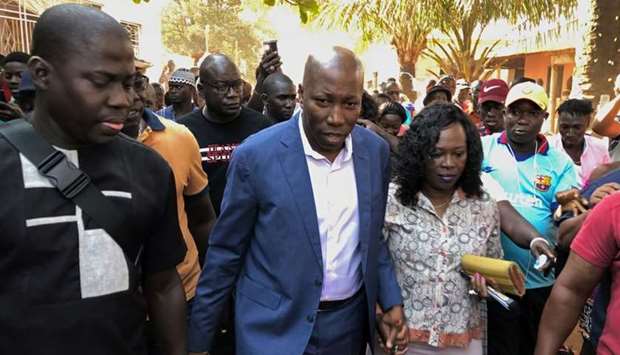* Both candidates promise to resolve political crisis
* Observer mission says vote has been calm
* Voters hope winner will usher in stability, reforms
Voters in Guinea-Bissau cast ballots on Sunday in a run-off presidential election between two former prime ministers who both promise to bring stability to the turbulent West African nation.
Voting in the election to succeed incumbent President Jose Mario Vaz went smoothly, African Union observers said, though one of the candidates accused authorities of stuffing ballot boxes, without providing evidence.
Both finalists say that if elected they will work to overcome a long-running political impasse and modernise the country of 1.6 million people, which has suffered nine coups or attempted coups since independence from Portugal in 1974.
The ruling PAIGC party's Domingos Simoes Pereira, 56, is seen as the front-runner after winning the first round on Nov. 24 with 40% of the vote.
His opponent, Umaro Cissoko Embalo, 47, is a brigadier general who came second with 28%, and political analysts say the run-off race could be close.
Vaz's five-year term was marred by regular high-level sackings, a barely functioning parliament, accusations of government corruption and weeks of turmoil in the run-up to the first-round ballot last month.
He was eliminated with just 12% of the vote.
"I voted to restore peace and tranquillity in Guinea-Bissau," said Caminho Injai, 65, a cleaning lady in the capital Bissau, echoing a sentiment expressed by many voters on Sunday.
Embalo's candidacy has won support from the main contenders who failed to reach the run-off, including Vaz.
Embalo questioned the first-round result, saying the final tally between him and Pereira was much closer than official figures had shown.
After voting in the town of Gabu on Sunday, he accused the interior ministry of stuffing ballot boxes, but did not provide any evidence to support his claim.
"We are going to fight any attempt at fraud," said Embalo, who wore a red-and-white keffiyeh around his head. "I will emerge the winner of the presidential election."
Muniro Conte, the prime minister's communications director, said Embalo's allegations were "totally false".
Pereira, who emerged from his polling place in Bissau smiling broadly and posed for photographs with poll workers, said the vote was "free and transparent".
"The people of Guinea-Bissau are confident, so I stay confident," he said.
Rafael Branco, the head of the African Union observation mission, said voting was going smoothly and that turnout in the morning hours appeared to be slightly higher than in the first round.
"My team has visited eight polling stations and citizens are exercising their civil right without obstruction or incident," he said.
Polling stations were due to close at 1700 GMT, with the electoral commission expected to announce the provisional result on Wednesday, Jan. 1.
Guinea-Bissau's next president will inherit major challenges including widespread poverty and an unstable political system in which the majority party appoints the government but the president has the power to dismiss it.
There have been seven prime ministers since Vaz took over in 2014 and political instability has hurt the economy, which depends heavily on volatile prices for cashew nuts, the main income source for over two-thirds of households.
Traffickers also exploit Guinea-Bissau's unpoliced waters and maze of forested islands as trans-shipment points for cocaine en route from South America to Europe.
Even so, Vaz is the first Guinea-Bissau president to have completed a full term, and won praise for conceding defeat after the first round.

